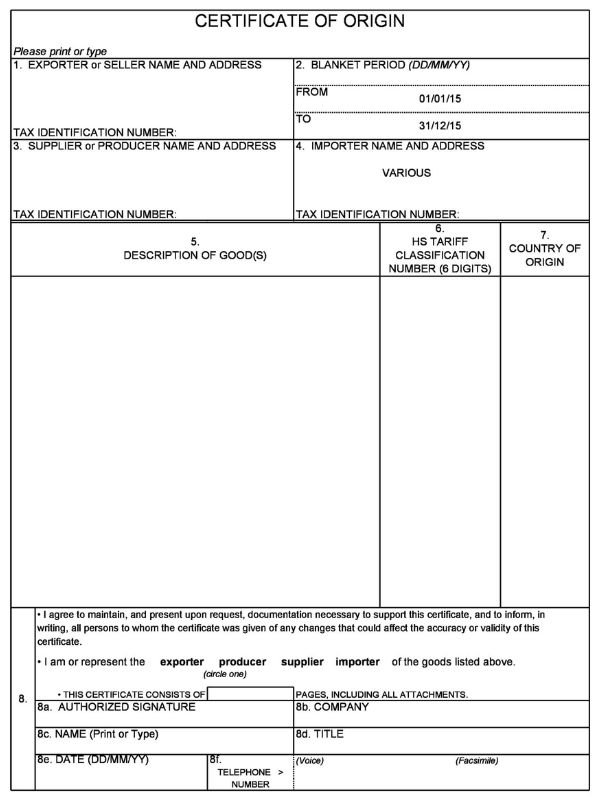Before packing, check this list of items prohibited from entering a particular country or region.
Key takeaways
- A Certificate of Origin (CO) is a document used to identify where a product was manufactured.
- Customs officials use COs to determine where goods originate, as this can impact import restrictions or the amount of tax the shipment owners might need to pay.
- Unlike a CO, title documents show proof of ownership and don't indicate the country where an item was produced.
What is a Certificate of Origin?
A Certificate of Origin (CO) officially identifies where manufacturers produced a product. When shipping personal items abroad, customs authorities may need to know where your goods originated, as it can impact potential duties or import restrictions, prevent fraud and determine preferential treatment eligibility. It's like a birth certificate for your belongings, whether furniture, clothing or a family heirloom, confirming their origin country.
If you're moving household goods or valuable items across borders, having a CO ready can simplify the customs process. It typically includes details like the exporter's name (either yours or the international shipping company representing you), a description of the items, and the country where they originated. With a CO, customs officers can ensure that everything complies with trade regulations, applicable duties are calculated correctly, and potential delays or extra charges at the destination port are avoided.
Manufacturers don't need to produce products in a single country to qualify for a CO. In most cases, specific rules dictate the percentage of a product's materials that must originate from one place. For example, a product may only need 50-60% of its components to come from a specific country to classify it as originating there. It is known as rules of origin and varies depending on particular trade agreements and the types of goods involved.
There are two main types of Certificates of Origin:
- Preferential: a Preferential Certificate of Origin (PCO) helps goods qualify for reduced or zero tariffs when specific trade agreements are in place, like the ASEAN Free Trade Area (AFTA) or the North American Free Trade Agreement (NAFTA).
- Non-preferential: a Non-Preferential Certificate of Origin (NPCO) doesn't offer special tariff treatments. Instead, it simply confirms the origin of your goods, which customs authorities need to calculate duties and ensures everything is complied with.
COs are increasingly moving towards digital formats, known as electronic Certificates of Origin (eCO). eCOs reduce paperwork, speed up processing times and add a layer of security against fraud. Many manufacturers and trade organisations prefer eCOs for their efficiency and reliability, so please contact the manufacturer to confirm which version to use.

Certificate of Origin example
Below is an example of a typical Certificate of Origin document.

While COs and titles play crucial shipping roles, they operate in different contexts and under various authorities.

Certificate of Origin vs title
A Certificate of Origin and a title are very different documents, although they are often confused. Individuals and overseas shippers use COs to certify the country where manufacturers produced a product or a vehicle. For instance, if you're shipping a valuable Persian rug from Iran, a CO helps customs officers confirm that it's genuine, impacting duties or import restrictions.
On the other hand, a title shows proof of ownership. In the United States, a vehicle title is a legal document issued by a state government that serves as proof of ownership. It's an essential document for any change in ownership, including buying, selling or transferring a vehicle to another person.
However, there's no direct equivalent to a title in other countries, such as the UK and Australia. In the UK, the V5C registration certificate is the primary document for identifying a vehicle and its registered owner. While in Australia, each state or territory issues a registration certificate, which functions similarly to the UK's V5C.
While COs and titles play crucial shipping roles, they operate in different contexts and under various authorities. COs are primarily issued by chambers of commerce, customs authorities or export bodies and focus on the origin of the goods. They help determine applicable tariffs and ensure compliance with international trade agreements. Titles, in contrast, are managed by local government departments such as the DMV in the United States and establish domestic legal ownership.
What is a Certificate of Origin for a vehicle?
A Certificate of Origin for a vehicle is a document that identifies a new car, motorbike or other motor vehicle as it leaves the factory. It's created by the manufacturer and lists vital information like the vehicle identification number (VIN), make, model and country of manufacture. A vehicle dealership typically hands the vehicle CO to the first buyer. It's used to establish initial ownership and, in some places, such as the US and Canada, serves as the basis for creating a vehicle title or registration.
A CO is crucial when shipping vehicles internationally. Customs authorities use it to determine its manufacturing country, impacting import duties, taxes and explicit regulations. For example, vehicles imported into the European Union must meet specific emission standards, while other countries, like Australia or Japan, have their own metrics for emissions, safety and technical specifications.













